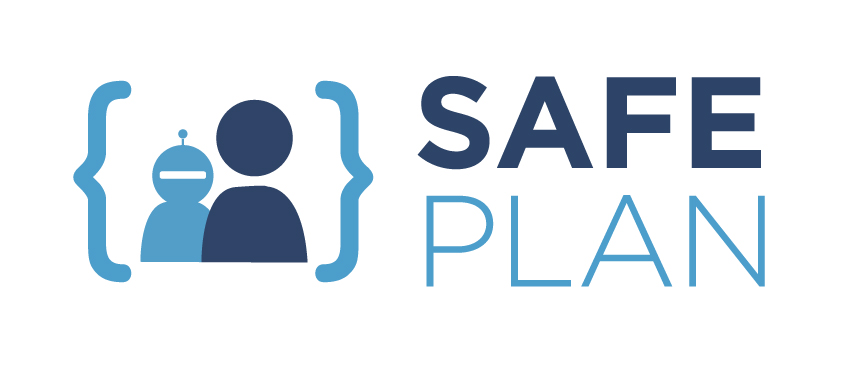
Important Dates
- March 18, 2016
Paper submission - April 1, 2016
Notification - April 30, 2016
Camera-ready - June 13, 2016
Workshop
Planning, Scheduling and Dependability in Safe Human-Robot Interactions (SafePlan)
We are pleased to invite you to contribute to this workshop which aims to bring together experts active in the field of planning and scheduling (P&S) with those in human-robot interaction with particular emphasis on safety. The sector experiences a paradigm shift from the traditional heavy-duty robot operating separated from the human worker in a fenced area to robots that work close to the human, adapting to the movements of the human and possibly even interacting with them. In this regard, tools and methodologies for verification and validation (V&V) of P&S systems have received relatively little attention. Therefore, important goals of the workshop are also to focus on interactions between P&S and V&V communities as well as to identify innovative V&V tools and methodologies when applied to P&S in human-robot collaboration scenarios.
The workshop is promoted together with the H2020 EU project FourByThree (http://www.fourbythree.eu) which aims to create modular, efficient, intuitive and safe robots that can work in close collaboration with humans. In this regard, the workshop aims at exploring the potential applications of P&S and/or V&V to robots as above operating in a modern factory environment where human-robot interaction is used as a means to pave the path for accelerated manufacturing whilst reducing costs.
The workshop is organized aiming to foster synergies with both the Robotics Track (https://icaps16.icaps-conference.org/robotics-track.html) chaired by Nick Hawes and Andrea Orlandini. In this regard, the workshop will serve as a means for those more involved in P&S to familiarise themselves with the challenges in safety critical applications, such as, for instance, human-robot collaborative applications where their expertise are indeed needed and can be readily applied.
Topics of interest include, but not limited to:
- How safe are today's robots to allow human-robot interaction in shared workspaces?
- What are the best technologies currently available to achieve safe robots?
- Human perspective (including trust towards and acceptance of robotic systems);
- How can planning and scheduling be applied to the safe human-robot interaction problem?
- What role do validity, verification and dependability play in safe human-robot interactions?
- P&S for long-term autonomy in human-robot collaborative scenarios;
- Integrated planning and execution in robotic architectures;
- Human-aware planning and execution in human-robot interaction, including safety;
- Failure detection and recovery in P&S systems;
- Formal methods for robot planning and control;
- V&V of P&S models, using technologies such as static analysis, theorem proving, and model checking;
- Consistency and completeness of P&S models;
- Runtime verification of plan executions;
- Generation of robust plan controllers;
Additionally, we are particularly looking for information on specific domains in which the co-presence of planning and scheduling capabilities should merge with the requirement of safety guarantee. The organizers of the workshop will provide initial cases from the manufacturing domain but are welcoming descriptions of other domains where similar needs are present to create a community of practice to address these similar problems under different scenarios.
Schedule
Monday (June 13, 2016)
| 9:00 | Welcome & FourByThree Introduction |
| 9:30 | (Keynote) Sharing spaces: planning and learning for interactions between robots and humans |
| 10:30 | Coffee Break |
| 11:00 | (Invited Talk) A Human-Robot Interaction-Planning Framework for Task Allocation in Collaborative Industrial Assembly Processes |
| 11:30 | Nested Safety Sets for Collision Avoidant Human-Robot Systems |
| 11:45 | Real-Time Obstacle Avoidance for Continuum Manipulator: Towards Safer Application in Human Environments |
| 12:00 | (Invited Talk) Teaching Robots to Do Our Chores via Safe and Natural Human-Robot Interaction |
| 12:30 | Lunch |
| 14:00 | (Invited Talk) Challenges in extending learning from demonstration to collaborative robots |
| 14:30 | Demonstration of Complex Task Execution using Basic Functionalities: Experiences with the Mobile Assistance Robot, “ANNIE” |
| 14:45 | Interacting with collaborative robots in industrial environments: A semantic approach |
| 15:00 | (Invited Talk) Can we use robot skin to enable a dependable human-robot cooperation? |
| 15:30 | Coffee Break |
| 16:00 | (Invited Talk) Automated Planning and Verification - A Never-Ending Story |
| 16:30 | Dynamic Task Planning for Safe Human Robot Collaboration |
| 16:45 | Round Table Discussion |
The Organizing Committee
- Ali Shafti, King’s College London
- Prof. Kaspar Althoefer, King’s College London
- Dr. Helge A. Wurdemann, University College London
- Dr. Amedeo Cesta, National Research Council of Italy (CNR-ISTC)
- Dr. Andrea Orlandini, National Research Council of Italy (CNR-ISTC)
- Dr. Iñaki Maurtua, Tekniker, Spain
The Program Committee
- Kaspar Althoefer (King’s College London, UK)
- Saddek Bensalem (VERIMAG, France)
- Stefano Borgo (CNR-ISTC, Italy)
- Amedeo Cesta (CNR-ISTC, Italy)
- Marcello Cirillo (SCANIA, Sweden)
- Michael Fisher (University of Liverpool, UK)
- Sami Haddadin (Leibniz Universitat Hannover, Germany)
- Klaus Havelund (NASA-JPL, USA)
- Joachim Hertzberg (University of Osnabrueck, Germany)
- Petar Kormushev (Imperial College London, UK)
- Daniele Magazzeni (King's College London, UK)
- Fulvio Mastrogiovanni (Universita' Degli Studi Di Genova, Italy)
- Iñaki Maurtua (IK4-Tekniker, Spain)
- David Musliner (Smart Information Flow Technologies, USA)
- Andrea Orlandini (National Research Council, CNR-ISTC, Italy)
- Jose Saenz (Fraunhofer IFF, Germany)
- Ali Shafti (King's College London, UK)
- Helge A. Wurdemann (University College London, UK)
- Jeremy Wyatt (University of Birmingham, UK)
